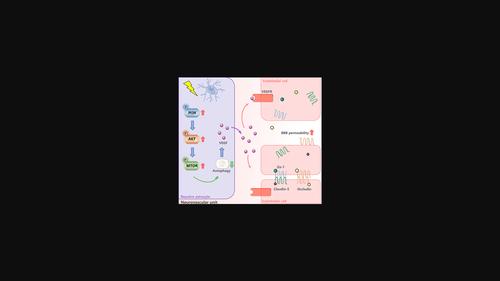Our official English website, www.x-mol.net, welcomes your feedback! (Note: you will need to create a separate account there.)
Enhanced VEGF secretion and blood–brain barrier disruption: Radiation-mediated inhibition of astrocyte autophagy via PI3K-AKT pathway activation
Glia ( IF 6.2 ) Pub Date : 2023-11-27 , DOI: 10.1002/glia.24491 Shifeng Zhang 1 , Mingping Li 1 , Yuemin Qiu 1 , Junyu Wu 1 , Xue Xu 1 , Qian Ma 1 , Zhihui Zheng 1 , Gengxin Lu 1 , Zhezhi Deng 1 , Haiwei Huang 1
Glia ( IF 6.2 ) Pub Date : 2023-11-27 , DOI: 10.1002/glia.24491 Shifeng Zhang 1 , Mingping Li 1 , Yuemin Qiu 1 , Junyu Wu 1 , Xue Xu 1 , Qian Ma 1 , Zhihui Zheng 1 , Gengxin Lu 1 , Zhezhi Deng 1 , Haiwei Huang 1
Affiliation

|
Radiation-induced damage to the blood–brain barrier (BBB) is the recognized pathological basis of radiation-induced brain injury (RBI), a side effect of head and neck cancer treatments. There is currently a lack of therapeutic approaches for RBI due to the ambiguity of its underlying mechanisms. Therefore, it is essential to identify these mechanisms in order to prevent RBI or provide early interventions. One crucial factor contributing to BBB disruption is the radiation-induced activation of astrocytes and oversecretion of vascular endothelial growth factor (VEGF). Mechanistically, the PI3K-AKT pathway can inhibit cellular autophagy, leading to pathological cell aggregation. Moreover, it acts as an upstream pathway of VEGF. In this study, we observed the upregulation of the PI3K-AKT pathway in irradiated cultured astrocytes through bioinformatics analysis, we then validated these findings in animal brains and in vitro astrocytes following radiation exposure. Additionally, we also found the inhibition of autophagy and the oversecretion of VEGF in irradiated astrocytes. By inhibiting the PI3K-AKT pathway or promoting cellular autophagy, we observed a significant amelioration of the inhibitory effect on autophagy, leading to reductions in VEGF oversecretion and BBB disruption. In conclusion, our study suggests that radiation can inhibit autophagy and promote VEGF oversecretion by upregulating the PI3K-AKT pathway in astrocytes. Blocking the PI3K pathway can alleviate both of these effects, thereby mitigating damage to the BBB in patients undergoing radiation treatment.
中文翻译:

VEGF 分泌增强和血脑屏障破坏:通过 PI3K-AKT 通路激活辐射介导的星形胶质细胞自噬抑制
辐射引起的血脑屏障(BBB)损伤是辐射引起的脑损伤(RBI)的公认病理学基础,而RBI是头颈癌治疗的副作用。由于 RBI 潜在机制的模糊性,目前缺乏治疗方法。因此,有必要确定这些机制以预防 RBI 或提供早期干预措施。导致血脑屏障破坏的关键因素之一是辐射诱导的星形胶质细胞激活和血管内皮生长因子 (VEGF) 的过度分泌。从机制上讲,PI3K-AKT 通路可以抑制细胞自噬,导致病理性细胞聚集。此外,它作为 VEGF 的上游途径。在本研究中,我们通过生物信息学分析观察了受辐射培养的星形胶质细胞中 PI3K-AKT 通路的上调,然后在辐射暴露后的动物大脑和体外星形胶质细胞中验证了这些发现。此外,我们还发现受辐射的星形胶质细胞自噬受到抑制,VEGF 过度分泌。通过抑制 PI3K-AKT 通路或促进细胞自噬,我们观察到对自噬的抑制作用显着改善,从而减少 VEGF 过度分泌和 BBB 破坏。总之,我们的研究表明,辐射可以通过上调星形胶质细胞中的 PI3K-AKT 通路来抑制自噬并促进 VEGF 过度分泌。阻断 PI3K 通路可以减轻这两种影响,从而减轻接受放射治疗的患者对 BBB 的损害。
更新日期:2023-11-27
中文翻译:

VEGF 分泌增强和血脑屏障破坏:通过 PI3K-AKT 通路激活辐射介导的星形胶质细胞自噬抑制
辐射引起的血脑屏障(BBB)损伤是辐射引起的脑损伤(RBI)的公认病理学基础,而RBI是头颈癌治疗的副作用。由于 RBI 潜在机制的模糊性,目前缺乏治疗方法。因此,有必要确定这些机制以预防 RBI 或提供早期干预措施。导致血脑屏障破坏的关键因素之一是辐射诱导的星形胶质细胞激活和血管内皮生长因子 (VEGF) 的过度分泌。从机制上讲,PI3K-AKT 通路可以抑制细胞自噬,导致病理性细胞聚集。此外,它作为 VEGF 的上游途径。在本研究中,我们通过生物信息学分析观察了受辐射培养的星形胶质细胞中 PI3K-AKT 通路的上调,然后在辐射暴露后的动物大脑和体外星形胶质细胞中验证了这些发现。此外,我们还发现受辐射的星形胶质细胞自噬受到抑制,VEGF 过度分泌。通过抑制 PI3K-AKT 通路或促进细胞自噬,我们观察到对自噬的抑制作用显着改善,从而减少 VEGF 过度分泌和 BBB 破坏。总之,我们的研究表明,辐射可以通过上调星形胶质细胞中的 PI3K-AKT 通路来抑制自噬并促进 VEGF 过度分泌。阻断 PI3K 通路可以减轻这两种影响,从而减轻接受放射治疗的患者对 BBB 的损害。



























 京公网安备 11010802027423号
京公网安备 11010802027423号